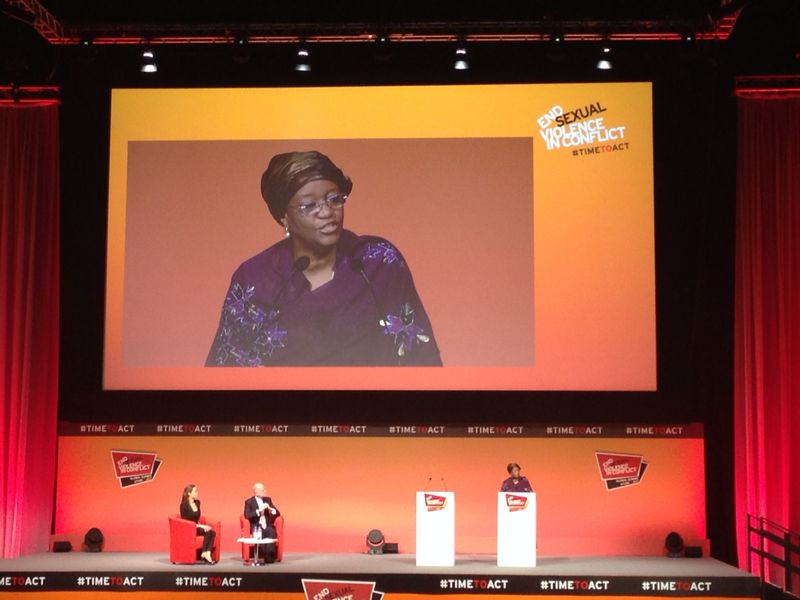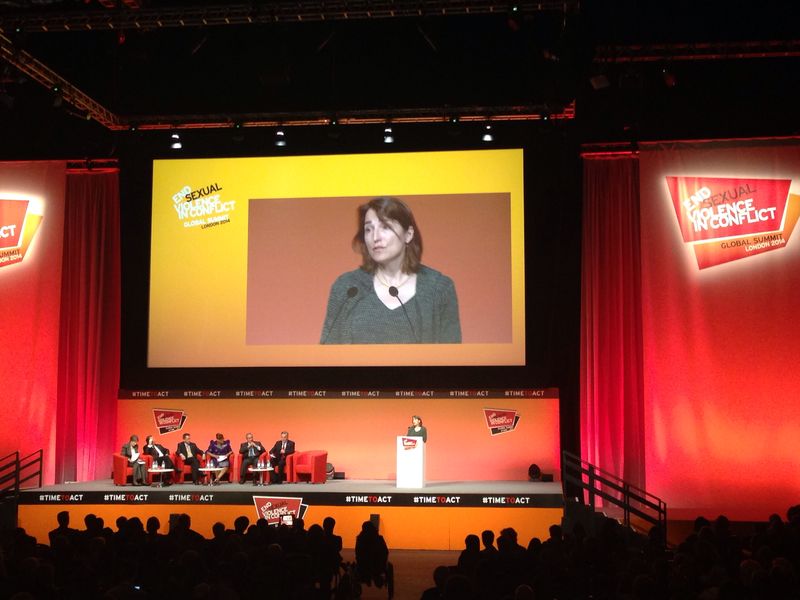 |
| UN Under Secretary General and Special Representative of the Secretary General on Sexual Violence in Conflict, Zainab Nawa Bangura. Photographs Tamil Guardian |
Countries pledged to end impunity for sexual violence in conflict as ministers from across the world gathered today at the global summit, 'End Sexual Violence in Conflict', taking place in London this week.
“I am more convinced than ever that all of our governments must dramatically increase their efforts,” co-host UK Foreign Secretary William Hague, told delegates and ministers present.
“Rape in war is not some lesser crime, it is an atrocity of the first order. There must be no safe have for perpetrators anywhere in the world,” he added, calling on fellow ministers to “help bring the full weight of the law down on this terrible crime.”
 British Foreign Secretary William Hague addresses the delegate |
Endorsing his call, co-host of the summit, Special Envoy Angelina Jolie called on all governments to “move from condemnation to action.”
“War zone rape is a preventable crime. Our response can never be that peace is more important than justice,” stressed Ms Jolie.
Welcoming the resounding pledge to commit to ending impunity, Mr Hague called on ministers to spend the next 24 hours to ensure concrete steps are taken to “remove rape from the arsenal of cruelty.”
“We must start to turn the tide against sexual violence in conflict, not only righting the terrible threat to international peace and security.”
The event, which included representatives of 115 countries, examined the questions of ‘why here, why now’ as well as the how to facilitate ‘closing the impunity gap’. Sri Lanka, along side Zimbabwe, Syria and North Korea, were absent from the event.
 US State Department's Sarah Sewall chairs a discussion entitled 'Closing the impunity gap' |
Chairing a panel discussion with foreign ministers, the US State Department’s Under Secretary of State for Civilian Security, Democracy and Human Rights, Sarah Sewall called for action, highlighting the “enormous lag between public and collective recognition of the problem [of sexual violence in conflict] and action.
“Sexual violence is also a matter of national and international peace and security,” she stressed.
Reiterating her statement, the Minister of Foreign Affairs in Bosnia and Herzegovina, Zlatko Lagumdzija, said “injustice anywhere is a threat to justice everywhere.”
Highlighting the discovery of a mass grave recently in Bosnia, Mr Lagumdzija said, “there must never be a time when we failed to prevent injustice and to fight for justice.”
The Foreign Minister of Jordan, Nasser Judeh, welcomed the unanimous agreement of the 145 countries that endorsed the declaration to end sexual violence, and stressed that there must be no impunity.
“No impunity [is] something we must all make sure,” he said, reiterating, “no impunity for those guilty of sexual violence” and adding that the crimes of sexual violence in conflict are war crimes and crimes against humanity.
The Minister of Gender and Development in Liberia, Julia Duncan-Cassell, highlighted the need to “widen the scope of accountability [for sexual violence in conflict] to peace time”.
“I am absolutely convinced that lack of accountability is the prime reason why these crimes continue to take place,” she said, adding that the work of the International Criminal Court (ICC) was vital to the ensuring justice for sexual violence, which she stressed should be seen as a war crime and crime against humanity.
Mexico’s Secretary of Foreign Affairs, Jose Antonio Meade Kuribrena, reflected on the country’s own experiences, and drew attention to vulnerability of ethnic minorities.
“Ethnic minorities are in many cases the victims of this crime,” he said, expressing hope that the call to action will be heeded.
Nigeria’s Foreign Affairs Minister, Aminu Bashir Wali, endorsed the call to action, stating,
“The time has come to redouble efforts in our fight against this scourge and hold perpetrators accountable.”
The President of the International Committee of the Red Cross (ICRC), Peter Maurer, who said he was “largely unaware of the magnitude and complexity of sexual violence in conflict” until a year ago, stressed that the crime “never occurs in isolation”.
“It is deeply linked to other violence and conflict,” he added.
Concluding the panel discussion, Helen Clark from the UN Development Programme in New York reiterated the resounding call to end impunity for perpetrators, whilst also highlighting HIV transmission as an additional and devastating consequence of war-time rape.
“Impunity for perpetrators remains a major issue, governments and the broader international community can and must do more,” she said.
 Helen Clark from the UNDP |
In a round table discussion, the UN Under Secretary General and Special Representative of the Secretary General on Sexual Violence in Conflict, Zainab Nawa Bangura, addressed delegates and pledged the UN would continue “supporting governments whose primary legal and moral responsibility is to protect their citizens.”
“Sexual violence is widespread yet largely invisible. For victims, rape is often a lifelong trauma yet perpetrators rarely face justice. Those commanding or perpetrating mass rape are rarely held accountable,” she added.
Nobel Laureate, Leymah Gbowee, highlighted the on-going nature of sexual violence conflict, that often does not end with armed conflict, but continues during peace time, when impunity prevails.
“[Sexual violence in conflict] does not arise solely out of the conditions of war. There acts at peace time largely unpunished,” she said.
“Militarisation and the presence of weapons legitimise new levels of brutality and impunity.”
The High Representatives of the Union for Foreign Affairs and Security Policy for the European Union, Baroness Ashton, highlighted three steps towards ending impunity, including securing international recognition of the crime, ensure accountability and justice, and prioritise the participation of women.
“Without the right laws and willingness of countries to implement them, impunity will continue,” she added.
The Chair of the African Union Commission, Dr Nkosazuna Dlamini Zuma, called for a zero tolerance policy on sexual violence in conflict by peacekeepers and military personnel.
“We must send a strong message that impunity will not prevail”, she said.
 Hundreds of delegates from governments across the world were in attendance at the summit |
We need your support
Sri Lanka is one of the most dangerous places in the world to be a journalist. Tamil journalists are particularly at threat, with at least 41 media workers known to have been killed by the Sri Lankan state or its paramilitaries during and after the armed conflict.
Despite the risks, our team on the ground remain committed to providing detailed and accurate reporting of developments in the Tamil homeland, across the island and around the world, as well as providing expert analysis and insight from the Tamil point of view
We need your support in keeping our journalism going. Support our work today.
For more ways to donate visit https://donate.tamilguardian.com.

